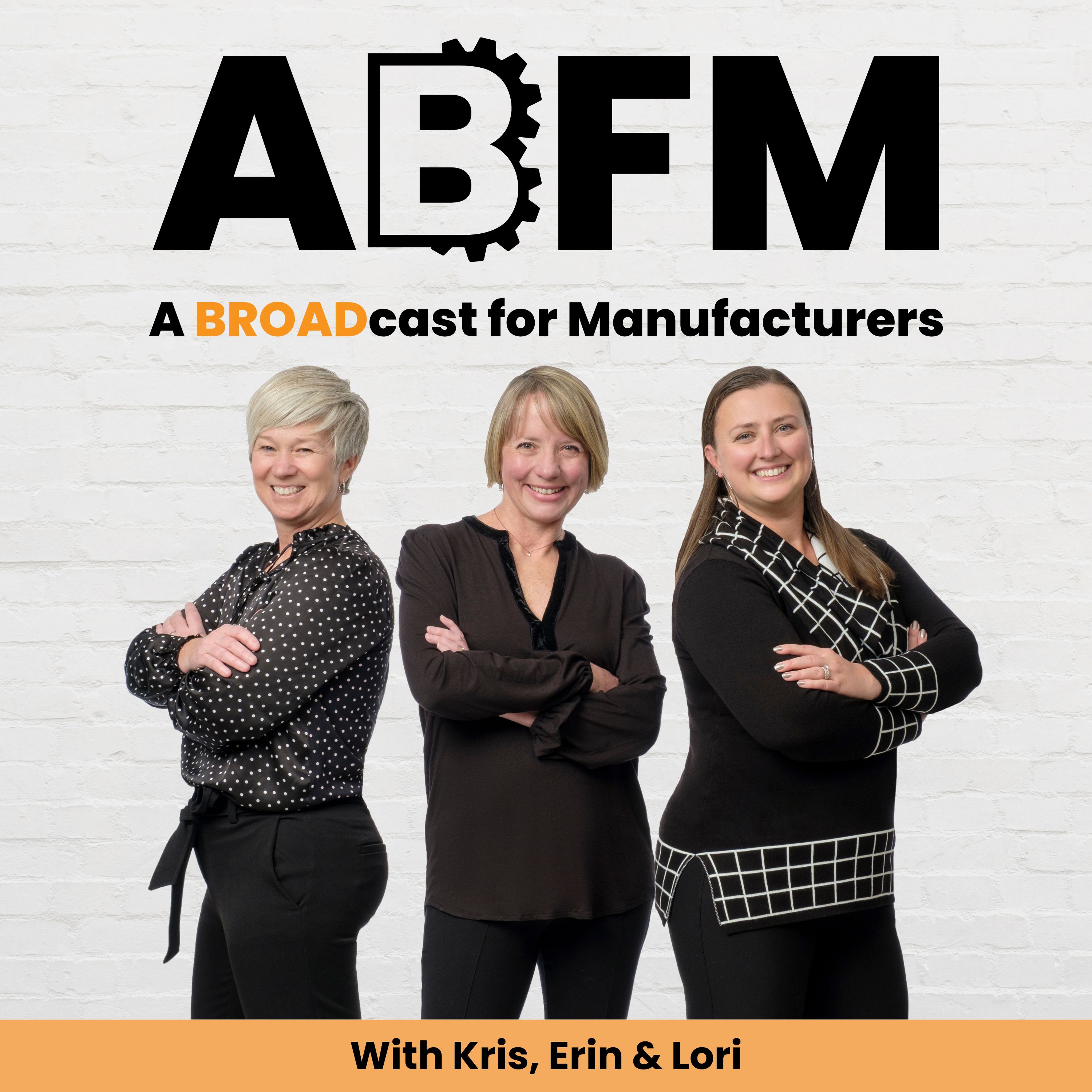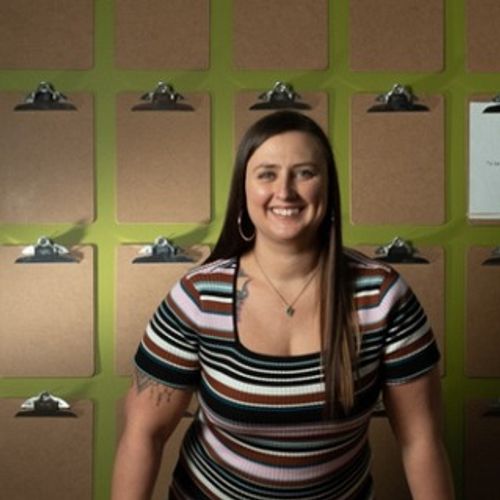Episode 33
33: AI's Evolution in the Manufacturing Industry
Lori: Erin what is something you just learned?
Erin: Well, I'm in the process of learning is that has there Yeah, I in the process of learning. So, um, we all remember the left brain, right brain, you know, the left brain is the logical part of you and the right brain is the more poetic part. That's been dispelled a bit. This is not exactly correct. However, there are parts of the brain that do master some of these things that seem sort of beyond consciousness, you know, what your personality for example, you know, we've heard the examples of someone who will get have brain damage, and then their personality will train change dramatically. There are also many instances of where you know, a leisure or a lesion, excuse my leisure, a lesion, or some sort of injury will really impact language on one side of the brain or on the other. And I think those have led us to believe that like, oh, yeah, they're, they're super different. And the whole goal is to like, kind of get them to work together and it'll be supercharged. And I'm, I'm, I'm learning that that's a misunderstanding, but still wanting to explore. It's called lateralization.
Erin: What is the competitive landscape once AI tools have been introduced?
Lori: I mean, yeah, that's a very valid argument. And a lot of what I'm seeing in the marketing space, that as a marketer, if you are not leaning into AI, you're going to, you're going to fizzle out fairly quickly. I mean, it's changing the landscape. It's not replacing jobs, it's creating new jobs. And you have to learn how to use the tools to create efficiencies, so that, you know, we can produce more and I could go on this tangent for a very long time. But I would recommend, and I think there's an opportunity to look at, I have two points to share, look at AI outside of just the production line, and how it can be incorporated into other aspects of not just manufacturing, but any business. I think there are a lot of opportunities for creating efficiencies. But one area that I do believe can be extremely beneficial and it aligns with some of the case studies in the article here is, you know, the one thing that any business owner or business leader wants to do is make intelligent business decisions. And what AI is doing is helping to move that process along a lot faster. Because it's gathering the data which is what everyone needs in order to be confident in the decision that they're making. And the data is telling a story. And, you know, historically, we would just as humans spend a lot of time analyzing and digging through that, where AI is. It's doing that for us. And so it's allowing us to move faster and have more confidence in that intelligent business decision-making process.
And so much more…
Connect with the broads!
Connect with Erin on LinkedIn and visit http://www.earthlinginteractive.com for web-based solutions to your complex business problems!
Connect with Lori on LinkedIn and visit www.keystoneclick.com for your strategic digital marketing needs!
Connect with Kris on LinkedIn and visit www.genalpha.com for OEM and aftermarket digital solutions!
Transcript
So it's fun right now in Milwaukee is the Blue Angels are flying all around, because this weekend is the air and water show. And it's
Erin:Do you go to the actual show?
Lori Highby:I have in the past this year. We're not able to make it. But you know, we live so close to the marquee airport that it's kind of fun to
Erin:oh, that's, that is super fun. Yeah. There's, you know, there's the big EA show in Wisconsin, which gets a lot of press people go there. People
Lori Highby:advancements. I mean, it's, it's just a cool. No, it's fascinating to me, you know, I fight often, but it's every time I'm just
Erin:I know, am I like, I'll sometimes start to think about and be like, You know what, I'm just gonna accept that this is reality, because I don't
Lori Highby:But in essence, right?
Erin:Yeah. But I think keeping that sense of wonder about flight is really important, especially as it gets more difficult, you know, like, security,
Lori Highby:Yeah. All right. Well, today, we don't have a guest, it's your two co hosts, myself, Lori Highby and Erin Courtenay. And we aren't here,
Lori Highby:article, and it relates to manufacturing just sound like something worth worthwhile to talk about. Your average original article was found on
Erin:Well, ever the contrarian, one of the things that came jumped down on me at first was the title a little misleading when we'll, because they
Erin:they sort of leave you hanging with the question mark. We don't know when it's going to transform manufacturing for everyone. So that's one answer.
Lori Highby:Yeah, no, I thought it was interesting. I agree that the headline kind of was a little misleading from that perspective, because
Erin:with the diapers. Yeah. Yeah. Yeah. Kimberly Clark, they had or was at Procter and Gamble. They had been pushing. I know from some previous
Erin:invest in innovation in r&d. And then finally, Really, there's just four in terms of AI. What struck me is there's a, there's a data set that is
Erin:call it? Yeah, better diapers, I'm all for it. So yeah, that was really interesting.
Lori Highby:I was just, I mean, not even getting into the AI component of this. But I was fascinated that this manufacturing process to create
Lori Highby:that's the only thing they've invested in technology to be able to capture the data. That's correct. That's that one. Yes, no. So they're not making
Erin:Yeah, I was struck by that, too, because this is one of the, as I understand it, well, this is it's a little bit different than so in AI, day
Erin:results, those become data, that data is dirty, might be one word that goes back into the system. So the if there's a sort of, it's a little bit
Erin:that it's worthwhile to artificially generate those errors so that they can collect the data on how they occur and just engineering that puzzle.
Lori Highby:I don't Yeah, I don't even I that's not my zone of genius at all. But that's what I think is fascinating to me when I read that. And one
Lori Highby:impressive.
Erin:Yeah, that's, that's what another like a bigger issue. This sort of on top of this article that is very interesting when you're looking at
Erin:managed to recoup because they're fixing these problems that have to be, you know, generated through a very large scale. But that's that's a big
Erin:implementation on your floor, you can reap some of the value of what's being learned, you know, obviously, you don't want to share that with their
Lori Highby:Yeah, I mean, I agree with that. 100%. And that would be the end goal. But let let, to some extent, the r&d, you know, come in at the
Lori Highby:kind of cool that, you know, the the was it that they were, they didn't really specify exactly what it was that they were developing or building.
Erin:That's when I listened recently to an interview with and, you know, I'm just gonna skip his name, but the the founder of DeepMind, at over at
Erin:and experimentation. And there are rewards within the AR AI system for the machine or the computer to begin to experiment and try things on its own.
Erin:exactitude that you need the system to begin to understand what where are the errors come from? And how can I prevent them? Because it's not just a,
Lori Highby:and I mean, to that point, it kind of ties in to the point of like, these really large entities are able to invest in learning those and
Lori Highby:We're but we're just not quite there yet. Because, you know, everyone got their own playgrounds or some, you know, shared tools being used in the AI
Erin:it is. And I think that's one of the sort of, it seems to me under discussed implications of AI and it goes right back to the manufacturing
Erin:development is really the phase that we're in. But we closed the public good development era. Before, I think, we really reached for the stars and
Erin:business driven AI development,
Lori Highby:and remote. Well, there's a lot to take in. Yeah, I don't even know how to respond to that. Well, I mean, you know, it's an evolving space
Erin:a bigger level, but I think manufacturing is really sort of a nice bottle to talk about the bigger implications of AI because it's, it's real,
Erin:conversation with a friend of mine, who's works in the building products industry, and, you know, not too far down the road, and he didn't give me
Erin:who's invested in being able to build those homes, and needs to sell a lot of those homes in order to pay back those industry. Well, the individual
Lori Highby:I mean, yeah, that's a very valid argument. And a lot of what I'm seeing in the marketing space, that as a marketer, if you are not
Erin:I'm maybe another time, because it is really interesting.
Lori Highby:But I would recommend, and I think there's an opportunity to look at, I have two points to share, look at AI outside of just the
Lori Highby:business leader wants to do is make intelligent business decisions. And what AI is doing is helping to move that process along a lot faster.
Lori Highby:intelligent business decision making process.
Erin:I really, I really liked that word, because I think you're helping us solve the problem, we just sort of sunk lay down in front of our listeners,
Erin:that doesn't mean that you don't have a business that you need to run intelligently. As long as you just so beautifully put it. And there are
Erin:imagine most of your competitors, direct competitors are also in terms of availability of capital to warranty AI are about where you are. So it's
Lori Highby:And it's not like I'm going to invest in a tool, and then things are magically going to happen it the investment is not just a
Lori Highby:that.
Erin:Now, it feels a little bit like one when you I don't know, when you have something worked out, you know, when you're using one of these tools,
Erin:lot of stories from the War Room. In fact, I've heard a few of them about, for example, a CRM, oh, it's going to solve your problems, you need to do
Erin:solve, then look for a tool that will help you solve that problem. Do not let yourself be drawn in by possibilities you hadn't even considered
Lori Highby:Now that this is a good time, I think to transition to our second half of the segment where we finish the sentence, I just learned
Erin:Well, I'm in the process of learning is that has there Yeah, I in the process of learning. So, um, we all remember the left brain, right brain,
Erin:will get have brain damage, and then their personality will train change dramatically. There are also many instances of where you know, a leisure or
Erin:misunderstanding, but still wanting to explore. It's called lateralization. What the, what the truth is behind that.
Lori Highby:Interesting. Yeah. How about you? Well, I was just gonna comment that I've always been middle braid. So I love it. That's even like
Erin:it's a good balance. Actually, that is so true. But you have to be to be a modern day marketer. You have to have that logician, thing going on,
Lori Highby:So I know I always like to go AI route. But since we had a healthy conversation on AI, I'll skip it today. But I just learned that,
Erin:Oh, that was a huge spike for them.
Lori Highby:Wow. Hmm. So I'm wondering how many other platforms where there's a lot of sharing password sharing are gonna go wow, that increased
Erin:You know, I'm, I feel like I felt like such a dingdong because I did not know, it was like a whole thing. And I wish I would have done it with
Lori Highby:I'm not gonna say what accounts I have. But I am the family sharing the Family
Erin:Sharing know, I
Lori Highby:mean, it goes a long way.
Erin:It made a lot of sense. But one has to wonder like, I don't know that they planned it out that way. But you get people hooked, right. And then
Lori Highby:they have different, like, packages or accounts, and I think you're gonna have so many number of users or so many people on your
Erin:cheers to you. Netflix, although I just want to say the content used to be better.
Lori Highby:Ah, ups and downs. Ups and downs. Ups and downs. I'd say its ups and downs. Okay. I don't know outright. Right now. I've been I've been
Erin:It's good. Okay. I haven't watched it. Okay. You would love it. I was okay. I saw a clip. And there was this one guy, and he was just talking so
Lori Highby:gonna like it. Yeah, okay. Okay. Okay. What else? I don't know. To watch to learn what?
Erin:Netflix exclusively. We're just on Netflix, but
Lori Highby:Oh, got it. That's so it's top of mind right now. Okay. I know there's, there's there's other ones and I'm sure like, I have a list on my
Erin:some of their time. All right. Well, awesome. Thanks for Thanks for getting that article to us. We'll put that in the show notes. I think I
Lori Highby:Yeah, this great conversation. All right. So three broads signing off here. Even though we're missing one, definitely reach out if




